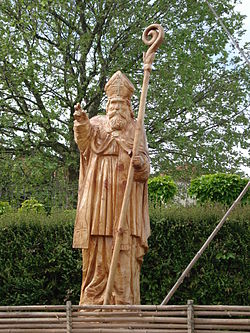Avitus of Vienne
| Saint Alcimus Ecdicius Avitus of Vienne | |
|---|---|

Statue in Saint-Avit dans la Drôme, in France
|
|
| Born | c. 470 |
| Died | 517/519 |
| Venerated in | Roman Catholic Church, Eastern Orthodox Church |
| Feast | February 5 |
Alcimus EcdiciusAvitus (c. 470 – February 5, 517 or 519) was a Latin poet and bishop of Vienne in Gaul. His fame rests in part on his poetry, but also on the role he played as secretary for the Burgundian kings.
Avitus was born of a prominent Gallo-Roman senatorial family related to Emperor Avitus.
His father was Hesychius, bishop of Vienne, where episcopal honors were informally hereditary. His paternal grandfather was an unknown western emperor of Rome.
Avitus was probably born at Vienne, for he was baptized by bishop Mamertus. About 490 he was ordained bishop of Vienne. In 499 Vienne was captured by Gundobad, king of the Burgundians, who was at war with Clovis, king of the Franks, where he came to the attention of that king. Avitus, as metropolitan of southern and eastern Gaul, took the lead in a conference between the Catholic and Arian bishops held in presence of Gundobad at Sardiniacum near Lyons. He won the confidence of King Gundobad, and converted his son, King Sigismund to Catholicism.
A letter of Pope Hormisdas to Avitus records that he was made vicar apostolic in Gaul by that pontiff; and in 517 he presided in this capacity at the Council of Epaon for restoring ecclesiastical discipline in Gallia Narbonensis. Avitus appears also to have exerted himself to terminate the dispute between the churches of Rome and Constantinople which arose out of the excommunication of Acacius; that this was accomplished before his death we gather from his letters.
Upon his death, Avitus was buried in the monastery of St. Peter and St. Paul at Vienne.
The literary fame of Avitus rests on his many surviving letters (his recent editors make them ninety-six in all) and on a long poem, De spiritualis historiae gestis, in classical hexameters, in five books, dealing with the Biblical themes of original sin, expulsion from Paradise, the Deluge, and the Crossing of the Red Sea. The first three books offer a certain dramatic unity; in them are told the preliminaries of the great disaster, the catastrophe itself, and the consequences. The fourth and fifth books deal with the Deluge and the Crossing of the Red Sea as symbols of baptism. Avitus deals freely and familiarly with the Scriptural events, and exhibits well their beauty, sequence, and significance. He is one of the last masters of the art of rhetoric as taught in the schools of Gaul in the 4th and 5th centuries. His poetic diction, though abounding in archaisms and rhythmic redundancy, is pure and select, and the laws of metre are well observed. The author of his article in the Catholic Encyclopedia claims "that Milton made use of his paraphrase of Scripture in writing Paradise Lost." Avitus also wrote a poem for his sister Fuscina, a nun, praising virginity.
...
Wikipedia
